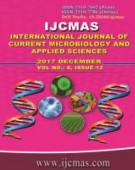


 National Academy of Agricultural Sciences (NAAS)
National Academy of Agricultural Sciences (NAAS)

|
PRINT ISSN : 2319-7692
Online ISSN : 2319-7706 Issues : 12 per year Publisher : Excellent Publishers Email : editorijcmas@gmail.com / submit@ijcmas.com Editor-in-chief: Dr.M.Prakash Index Copernicus ICV 2018: 95.39 NAAS RATING 2020: 5.38 |
In pepper, cytoplasmic male sterility trait is important for cost effective hybrid seed production which helps in commercial hybridization without manual emasculation and pollination. Commercial use of CMS hybrid necessitates stable performance of sterile and fertile to promise genetically consistent F1 seed production and reduced the risk of incomplete fertility. Therefore, the present study was carried out to explore the fertility restoration of 20 CMS based sweet pepper (Capsicum annum L. var. grossum) hybrids at two different locations IARI, Regional Station, Katrain, Himachal Pradesh, and IARI, New Delhi. The trials were performed in a randomized block design with three replications. In each environment, plants were assessed for pollen viability, pollen germination and number of seeds per fruit. Among the hybrids tested KTCA3 X KTCR1, KTCA3 X KTCR4, KTCA3 x KTCR5, KTCA5 X KTCR1, KTCA5 X KTCR5, KTCA5 X KTCR6, KTCA5 X KTCR9 and KTCA5 X KTCR10 showed same fertility status estimated based on mean values and were stable in both the locations. There is substantial variation among hybrids over the locations for pollen fertility. Among hybrids, KTCA5 x KTCR5 and KTCA5 x KTCR9 showed stable and good performance at both the locations. Since the mean performance of number of seeds is better in location 1 than in location 2, hence it suggests that location 1 is preferable for seed production. The pooled analysis data revealed a significant (P ≤ 0.001) genotypes x environment interactions for all the traits. In the present study, we observed that the fertility restoration of hybrids was dependent not only on the genetic makeup of the plant but also influenced by the environment conditions of the plants grown. Moreover, our results provide a comprehensive overview for our understanding of the environment effect on the function of fertility restoration genes and to develop stable restorer line for hybrid breeding.
 |
 |
 |
 |
 |